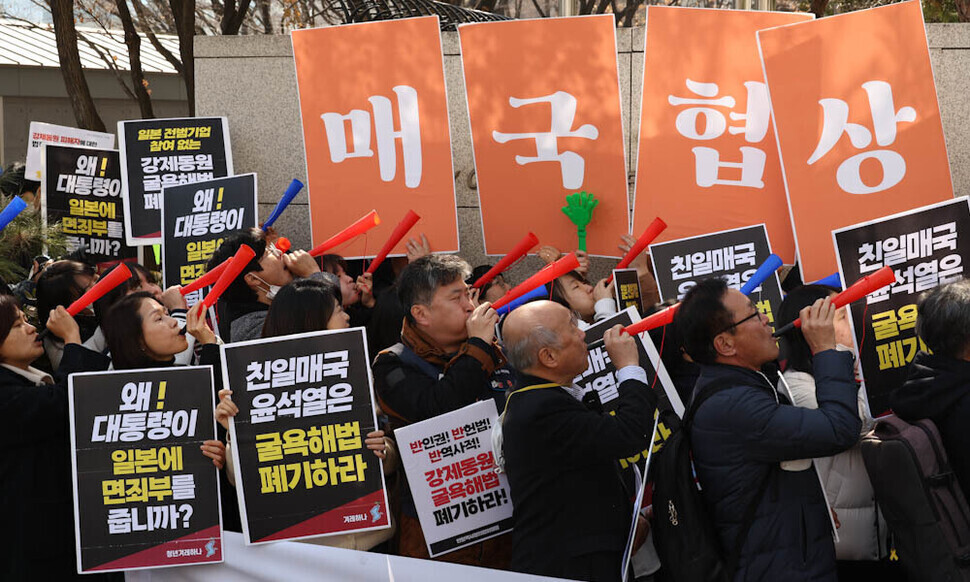hankyoreh
Links to other country sites 다른 나라 사이트 링크
How voluntary will contributions of Korean firms be under new plan for compensating forced labor victims?

After the government announced plans to create a compensation fund for victims of Japanese colonial era forced mobilization using “voluntary donations” from domestic companies, relevant firms were simply expected to go with the plan. However, with the plan being unilaterally announced without prior coordination with the companies, local firms report feeling begrudged to take part in the compensation.
According to financial circles on Monday, companies that received economic cooperation funds from Japan following the signing of the 1965 claims settlement agreement between South Korea and Japan are being mentioned as potential targets to take part in this new fund. This is despite the government’s emphasis that the fund will be created through voluntary participation from the private sector.
However, the Foundation for Victims of Forced Mobilization by Imperial Japan, which falls under the Ministry of the Interior and Safety and will be in charge of compensation for the victims, asserted that it won’t request donations from companies.
A POSCO official told the Hankyoreh over the phone on Monday that the company plans to “actively review” details surrounding the firm’s potential participation in the fund through “official procedures.”
In 2012, POSCO had already promised to donate 10 billion won (US$7.7 million) to the foundation but has so far only donated 6 billion won and put off paying the remaining 4 billion.
The Pohang Iron and Steel Co., POSCO’s predecessor, received $119.48 million out of the total US$500 million worth of economic cooperation funds provided by Japan.
Meanwhile, the Korea Tobacco & Ginseng Corp. (KT&G) also commented on the government’s plan, saying the company is “carefully following the process of social discussions regarding the compensation for victims of forced labor” and plans to “faithfully cooperate in the process of implementing the social agreement.”
An official from Hana Bank also commented, “If we receive an official request to make a donation, we plan to conduct a legal review concerning the means and form [of such donations].”
Some companies are also arguing that the criteria determining which specific companies were beneficiaries of the Japanese economic cooperation funds are ambiguous.
“The benefits of the claims agreement were construction projects such as the restoration of the Han River railroad bridge,” a Korea Railroad Corp. (KORAIL) official said.
“Railroad construction projects are handled by Korea National Railway, not KORAIL, we are just the operating company. I don’t know if we will be the ones paying [the donations] or if it will be Korea National Railway,” the official added.
Similarly, an official from the Industrial Bank of Korea (IBK) said that the company already “fully repaid” the economic cooperation funds it had received at that time. “A legal review is necessary on the method of making the donations,” the official said.
It’s also worth noting that the financial industry’s exchange projects for future-oriented South Korea-Japan relations were excluded from the government's official announcement.
Previously, Japanese media had reported that the Federation of Korean Industries “proposed a youth project” to the Japanese Business Federation, or Keidanren.
The Federation of Korean Industries and Japan Business Federation, the representatives of the financial industries of the two countries, discussed plans to raise funds to set up a youth scholarship project.
Keidanren, however, is also a member company of Mitsubishi Heavy Industries and Nippon Steel, the defendants in the forced mobilization lawsuit filed by victims.
Nevertheless, it seems that the governments and the two organizations have neither discussed nor coordinated the project in advance.
To this point, a Federation of Korean Industries official commented, saying, “As of now, there are no facts that we can confirm. We will respond according to the statements made by the governments of the two countries.”
By Kim Hoe-seung, senior staff writer
Please direct questions or comments to [english@hani.co.kr]

Editorial・opinion
![[Editorial] Does Yoon think the Korean public is wrong? [Editorial] Does Yoon think the Korean public is wrong?](https://flexible.img.hani.co.kr/flexible/normal/500/300/imgdb/original/2024/0417/8517133419684774.jpg) [Editorial] Does Yoon think the Korean public is wrong?
[Editorial] Does Yoon think the Korean public is wrong?![[Editorial] As it bolsters its alliance with US, Japan must be accountable for past [Editorial] As it bolsters its alliance with US, Japan must be accountable for past](https://flexible.img.hani.co.kr/flexible/normal/500/300/imgdb/original/2024/0417/6817133413968321.jpg) [Editorial] As it bolsters its alliance with US, Japan must be accountable for past
[Editorial] As it bolsters its alliance with US, Japan must be accountable for past- [Guest essay] Amending the Constitution is Yoon’s key to leaving office in public’s good graces
- [Editorial] 10 years on, lessons of Sewol tragedy must never be forgotten
- [Column] A death blow to Korea’s prosecutor politics
- [Correspondent’s column] The US and the end of Japanese pacifism
- [Guest essay] How Korea turned its trainee doctors into monsters
- [Guest essay] As someone who helped forge Seoul-Moscow ties, their status today troubles me
- [Editorial] Koreans sent a loud and clear message to Yoon
- [Column] In Korea’s midterm elections, it’s time for accountability
Most viewed articles
- 1Samsung barricades office as unionized workers strike for better conditions
- 2[Column] The clock is ticking for Korea’s first lady
- 3[Editorial] When the choice is kids or career, Korea will never overcome birth rate woes
- 4S. Korea, Japan reaffirm commitment to strengthening trilateral ties with US
- 5[Editorial] As it bolsters its alliance with US, Japan must be accountable for past
- 6[Guest essay] How Korea turned its trainee doctors into monsters
- 7Japan officially says compensation of Korean forced laborers isn’t its responsibility
- 8[News analysis] After elections, prosecutorial reform will likely make legislative agenda
- 9[Editorial] Does Yoon think the Korean public is wrong?
- 10Strong dollar isn’t all that’s pushing won exchange rate into to 1,400 range